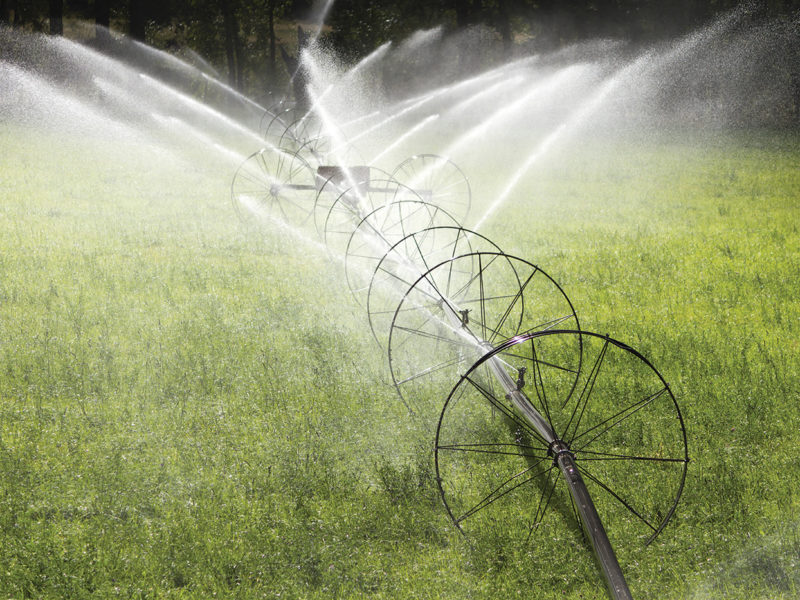DUNCAN – It’s been more than three years since Ken Ellison applied for licences to draw water from the three wells on his farm in the Cowichan Valley as part of a new groundwater management regime introduced under the Water Sustainability Act in 2016.
With water restrictions in his area becoming more common, the idea of having priority access in the event of water restrictions under the first in time, first in right (FITFIR) provisions of the new act appealed to him.
But, like hundreds of other well owners, Ellison has yet to receive his licences. Adding to his frustration, the same act he believed would protect his water rights was invoked in 2019 to prevent Ellison and other farmers in the Koksilah watershed from irrigating their crops.
“Our water was taken away from us for six weeks, with absolutely no consideration for FITFIR and still to this date I have heard nothing about a confirmation on my licences,” he says. “The promise of FITFIR is the only reason that I went forward with these applications, and government has mishandled this program the whole way through!”
Ellison is not alone in his frustration. Other users have seen the provisions of the new regime for non-domestic groundwater users as needlessly confusing and more restrictive than anticipated. Many have simply held off applying for a licence.
According to the most recent statistics from the BC Ministry of Forests, Lands, Natural Resource Operations and Rural Development, just 4,069 licence applications had been received by March 31 of an estimated 20,000 wells in the province. And of these applications, just 1,292 licences have been issued.
This is shaping up to be a massive headache for government, which initially gave existing users two years to register their wells and obtain groundwater licences. The province waived application fees as an incentive. But a lack of uptake forced the province to extend the deadline twice. Users now have until March 1, 2022 to register their wells without losing their FITFIR designation. The province is on record saying that no further extensions will be given.
“If the vast majority of users do not apply, they are not going to stop using their water, so government will have a big enforcement and non-compliance problem on their hands,” says the province’s former deputy comptroller of water rights Mike Wei, who helped draft the new groundwater regulation. “Politically, that will be a difficult thing to manage.”
The concerns were highlighted in a report Wei co-authored for the Partnership for Water Sustainability in BC last month.
New users – those who applied for wells drilled or commissioned on or after March 1, 2016 – also require a licence. However, historical users without a licence on March 1, 2022 will be deemed new users, too.
“Any new-use applications received prior to theirs will get a more senior priority date. By not applying, historical groundwater users are effectively giving their current volume of groundwater use back to the government for reallocation,” notes the report.
Wei appreciates the frustration Ellison and other applicants have experienced.
“When you apply, people don’t hear anything from government for years and silence is deadly,” Wei says.
In addition to not keeping applicants informed, the government has not explained the benefits of applying for a licence and the consequences of non-compliance to those who have yet to apply, Wei says. Historical water users put their livelihoods at risk by not applying for a licence and there could be far-reaching implications for BC farmers and rural businesses.
“The transition is meant to bring people into the fold, not to exclude people from the fold,” he says. “If the government signals that and communicates clearly what all this means for the average business person, that would be great. It’s not a tax grab; it’s a transition from one system of right of access to another.”
To build confidence in the new groundwater regime, the recent report says the province should dedicate adequate staff to processing applications and promptly issue licences to existing users.
The recent provincial budget took a step in this direction with an $11 million allocation to support FrontCounterBC offices around the province.
BC Agriculture Council executive director Reg Ens expects much of this to be spent on staffing, improving service delivery and reducing processing times.
“Specifically where we’re hoping that helps is with the groundwater licensing issue – that huge backlog that’s there,” he says.
The report also urges the province to explain the consequences of not obtaining a licence, and being open to extending the application deadline.
Wei thinks the province should undertake compliance activities to show it’s serious about unauthorized water use. It also needs to rethink its deadline for implementation.
“I just don’t see 10 months being sufficient, especially during a pandemic with no end in sight,” says Wei. “Government is the only one who can extend the timeframe.”


 Province to lift restrictions on second homes
Province to lift restrictions on second homes